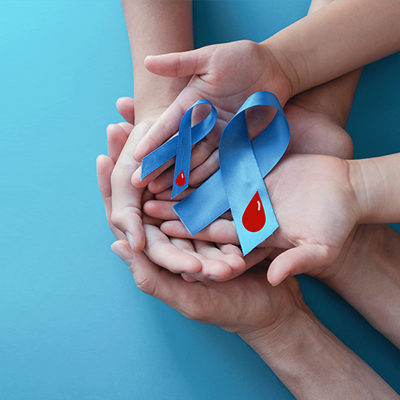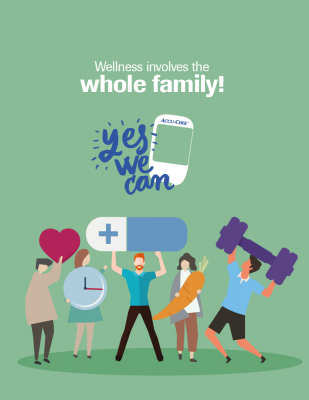Talking about diabetes
I recently heard something interesting about diabetes and I want to share it with you. In a conversation with Professor Katharine Barnard-Kelly, Ph.D. she said she believed people who have had diabetes for a while fundamentally know how to manage the mechanics of it; the challenge is how to apply it in the context of their own lifestyle. Juggling diabetes alongside other everyday priorities can be an enormous task, and it is little wonder that so many people experience diabetes burden and distress. A simple approach to reduce the feeling...
Read MoreLiving in Range
Feeling your best—life in your target range When you find your mind wandering—thinking about the future—what do you see? Whether you dream about taking photos somewhere amazing or starting a family, or you'd simply like to have more energy or sleep through the night, keeping your blood glucose in line can help you achieve it.Sometimes it can seem like diabetes is all about the numbers. But your efforts to stay within your target ranges for blood glucose before and after meals, as well as meeting your HbA1c goal, are really about feeling your best today and for years to come. Self-checks vs. HbA1c and...
Read MoreManaging Sick Days
Feeling fine? It's the perfect day to create a sick day plan. When you're feeling ill, you'd like nothing more than to lie in bed with a good book or movie. Yet that's when you need to focus even more on diabetes self-care. The key to sick days with diabetes is doing all of the thinking ahead of time. That way, when you don't feel like concentrating, you can simply follow the plan. What to include in your plan Involve your diabetes care healthcare team in developing your sick day plan—ask them when you should call for help, how often you should check...
Read MoreDiabetes Basics
Understanding the basics of diabetes is the first step in gaining control of your health. Let’s look at what causes diabetes, some of the common symptoms, the benefits of healthy living, and what to do if you’ve just been diagnosed. What is diabetes? Diabetes is a chronic disease. Your blood sugar levels are controlled by insulin, a hormone produced by your pancreas. When you eat, food gets broken down and glucose enters your bloodstream. Insulin takes the glucose out of your bloodstream and allows it to enter your cells where it is broken down and turned into energy. If you have diabetes, either you...
Read MoreWays to Increase Activity
Exercise is good for everyone, but for people with diabetes, it can make a big difference in keeping your blood sugar level under control. Not only that, but staying active allows your cells to process insulin more efficiently, improving your overall A1C levels. The many benefits to staying active Exercise is one of the cornerstones of managing your diabetes, because the list of benefits for people with diabetes is long. Exercise can:1 Improve insulin sensitivity for people with type 12 Decrease the glucose in your blood for people with type 2...
Read MoreTransitions: From Orals to Insulin
Insulin and type 2 diabetes: 5 facts you should know Has your healthcare provider talked to you about insulin? For many people, this can bring on mixed feelings and questions—often based on myths that simply are not true. Here are 5 facts to keep in mind. Diabetes is an insulin problem, not a sugar problem. After all, sugar doesn't cause diabetes. People with type 2 diabetes don't manufacture enough insulin, or their bodies can't use it properly, so they're unable to process the food they take in.1 Sometimes it takes insulin...
Read MoreTreating Low BG
You may recognize the feeling—feeling hungry, dizzy, sweaty or just a little bit "off." These signs of hypoglycaemia, or low blood glucose, mean it's time to take action. What causes low blood glucose? For most people, low blood glucose refers to anything below 72 mg/dl, although your number may be different.1 Low blood glucose can be caused by taking too much medication, not having enough to eat or exercising. In fact, hypoglycaemia can occur up to 12 hours after you've been physically active.1 Don't be too hard on yourself, though. Fifty percent of the time, there's no way of knowing...
Read MoreWhat is A1C?
Your A1C number Consider your A1C number (also known as HbA1c or glycated hemoglobin) as a snapshot of your blood glucose levels over several months. Over time, glucose naturally attaches itself to your blood cells. When this happens, the cell is considered “glycated.” The more glucose in your blood, the more glycated A1C cells you have. What’s an optimal A1C number? The recommended A1C target for a person with diabetes is 7% or lower—some people remember this figure as “lucky number 7.” However, while your A1C number gives you and your doctor an idea of how your diabetes is being managed over time, it...
Read MoreHow Parents with Diabetes Can Make Their Wellness a Family Priority
For many of us, diabetes is a family affair. Especially when a parent has diabetes, managing the disease with physical activity and healthy food choices can impact every member of the family. This World Diabetes Day, we’re thinking about this as an opportunity to explore the ways diabetes can actually help the entire family get healthy. What do you do when your kids want pizza but you know your blood sugar has been high today? Or when you need to burn some energy but you can’t get your kids to get off the couch and go to the park with you? As a parent managing diabetes, you have an opportunity to model positive choices that can...
Read MorePages
Living in Range
Feeling your best—life in your target range When you find your mind wandering—thinking about the future—what do you see? Whether you dream about taking photos somewhere amazing or starting a family, or you'd simply like to have more energy or sleep through the night, keeping your blood glucose in line can help you achieve it.Sometimes it can seem like diabetes is all about the numbers. But your efforts to stay within your target ranges for blood glucose before and after meals, as well as meeting your HbA1c goal, are really about feeling your best today and for years to come. Self-checks vs. HbA1c and...
Read MoreManaging Sick Days
Feeling fine? It's the perfect day to create a sick day plan. When you're feeling ill, you'd like nothing more than to lie in bed with a good book or movie. Yet that's when you need to focus even more on diabetes self-care. The key to sick days with diabetes is doing all of the thinking ahead of time. That way, when you don't feel like concentrating, you can simply follow the plan. What to include in your plan Involve your diabetes care healthcare team in developing your sick day plan—ask them when you should call for help, how often you should check...
Read MoreDiabetes Basics
Understanding the basics of diabetes is the first step in gaining control of your health. Let’s look at what causes diabetes, some of the common symptoms, the benefits of healthy living, and what to do if you’ve just been diagnosed. What is diabetes? Diabetes is a chronic disease. Your blood sugar levels are controlled by insulin, a hormone produced by your pancreas. When you eat, food gets broken down and glucose enters your bloodstream. Insulin takes the glucose out of your bloodstream and allows it to enter your cells where it is broken down and turned into energy. If you have diabetes, either you...
Read MoreWays to Increase Activity
Exercise is good for everyone, but for people with diabetes, it can make a big difference in keeping your blood sugar level under control. Not only that, but staying active allows your cells to process insulin more efficiently, improving your overall A1C levels. The many benefits to staying active Exercise is one of the cornerstones of managing your diabetes, because the list of benefits for people with diabetes is long. Exercise can:1 Improve insulin sensitivity for people with type 12 Decrease the glucose in your blood for people with type 2...
Read MoreTransitions: From Orals to Insulin
Insulin and type 2 diabetes: 5 facts you should know Has your healthcare provider talked to you about insulin? For many people, this can bring on mixed feelings and questions—often based on myths that simply are not true. Here are 5 facts to keep in mind. Diabetes is an insulin problem, not a sugar problem. After all, sugar doesn't cause diabetes. People with type 2 diabetes don't manufacture enough insulin, or their bodies can't use it properly, so they're unable to process the food they take in.1 Sometimes it takes insulin...
Read MoreTreating Low BG
You may recognize the feeling—feeling hungry, dizzy, sweaty or just a little bit "off." These signs of hypoglycaemia, or low blood glucose, mean it's time to take action. What causes low blood glucose? For most people, low blood glucose refers to anything below 72 mg/dl, although your number may be different.1 Low blood glucose can be caused by taking too much medication, not having enough to eat or exercising. In fact, hypoglycaemia can occur up to 12 hours after you've been physically active.1 Don't be too hard on yourself, though. Fifty percent of the time, there's no way of knowing...
Read MoreWhat is A1C?
Your A1C number Consider your A1C number (also known as HbA1c or glycated hemoglobin) as a snapshot of your blood glucose levels over several months. Over time, glucose naturally attaches itself to your blood cells. When this happens, the cell is considered “glycated.” The more glucose in your blood, the more glycated A1C cells you have. What’s an optimal A1C number? The recommended A1C target for a person with diabetes is 7% or lower—some people remember this figure as “lucky number 7.” However, while your A1C number gives you and your doctor an idea of how your diabetes is being managed over time, it...
Read MoreHow Parents with Diabetes Can Make Their Wellness a Family Priority
For many of us, diabetes is a family affair. Especially when a parent has diabetes, managing the disease with physical activity and healthy food choices can impact every member of the family. This World Diabetes Day, we’re thinking about this as an opportunity to explore the ways diabetes can actually help the entire family get healthy. What do you do when your kids want pizza but you know your blood sugar has been high today? Or when you need to burn some energy but you can’t get your kids to get off the couch and go to the park with you? As a parent managing diabetes, you have an opportunity to model positive choices that can...
Read More








